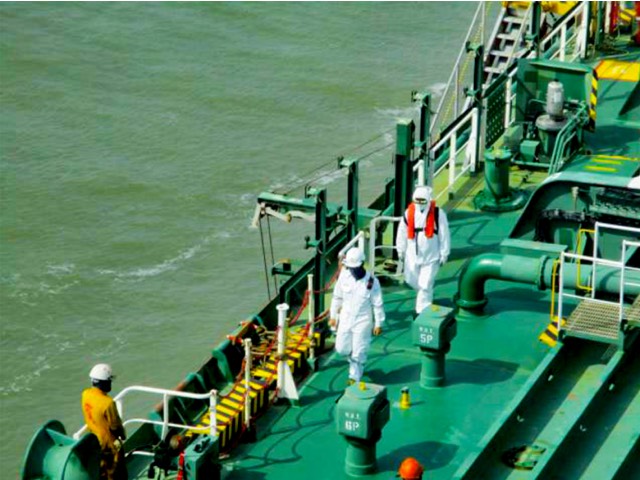Following the recent highlighting to Human Rights at Sea (HRAS) of concerns from seafarers about lack of access to, and availability of, Personal Protective Equipment (PPE) while serving on vessels transiting global shipping lanes, the charitable NGO has engaged with the maritime industry most recently speaking with the Thome Group about their actions in response to the COVID-19 pandemic. This follows recent HRAS articles challenging the PPE issue.
In response to a series of questions submitted to the senior management, the following answers were received.
Q. When did you first become aware of the need for comprehensive PPE for crew in relation to COVID-19? Was this via industry or external information sources, or a combination of both – if so, what were those sources?
A. At the outset, we relied on the WHO guidelines issued at the time of the COVID-19 outbreak in China as it was the most verifiable and trusted source.
Q. What were your immediate planning considerations, and how did they materialise to PPE being provided to staff and crew?
A. The safety of our seafarers is and remains our main concern. Upon assessing the ever-evolving situation and reviewing guidance from the WHO in understanding the risks of transmission, we started to implement PPE measures onboard our vessels to safeguard our crew. As the situation progressed, several industry sources, including national health authorities globally, set forth additional requirements which we assessed and implemented as well.
Q. Did you have an existing PPE policy related to infectious diseases and if so, can that be disclosed as supporting evidence? If you have an updated policy, can that also be disclosed?
A. Following the SARS and MERS outbreaks, we have an existing infectious diseases policy in place but, given the novel nature of this virus, we created an interim document to supplement this policy. This helped update our existing measures upon evaluation of the ongoing situation. Once this pandemic abates, we will integrate the lessons learnt into the main infectious diseases policy. All these internal policies are confidential in nature so the Thome Group is unable to make them publicly available.
Q. What concerns have you received from seafarers in relation to access to and use of PPE, as well as any related mental health concerns relating to COVID-19?
A. The global supply chain for PPE has been and continues to be strained and understandably, world-wide national authorities have prioritised supplies for frontline workers. In spite of that, our initial actions allowed us to mitigate this by requiring vessels to procure relevant PPE early on. Risks related to the use of PPE were mitigated by sending out relevant WHO posters and feedback has been positive. Additionally, we’ve supplemented this with enhanced instructions to further avoid the misuse of PPE both on board and ashore. Crew mental health continues to be a focal point for the Thome Group and the industry at large. Whilst we have not received any concerns related to this, we have rolled out initiatives to manage and address the mental well-being of our seafarers.
Q. What detailed measures have you now put in place for the continued supply of, access to and use of PPE relating to COVID-19 concerns?
A. There is a close communication between our procurement department and global suppliers to ensure sufficient and timely supply of PPE.
Q. What are your concerns for the medium-long term if the COVID-19 pandemic continues into 2021?
A. Restrictions on international travel has resulted in crew rotations becoming stagnated. Though restrictions are gradually easing, crew mental health will continue to be a primary concern to us all.
HRAS Comment
The issue of transparency of commercial actions throughout the maritime industry in dealing with the global COVID-19 pandemic in relation to the welfare, health and safety of seafarers undertaking daily shipping operations remains a key aspect to help ensure that seafarers and their dependents are supported, not just during the immediacy of the crisis, but afterwards and in the longer-term. This is a specific focus for the charitable NGO in their industry relationships, most recently highlighted in the partnership with RightShip.
Human Rights at Sea thanks the Thome Group for being forward-leaning and willing to speak to an independent human rights platform, and for agreeing to the publication of responses to our questions, noting the confidentiality of internal policies.
Source: Human Rights at Sea









































